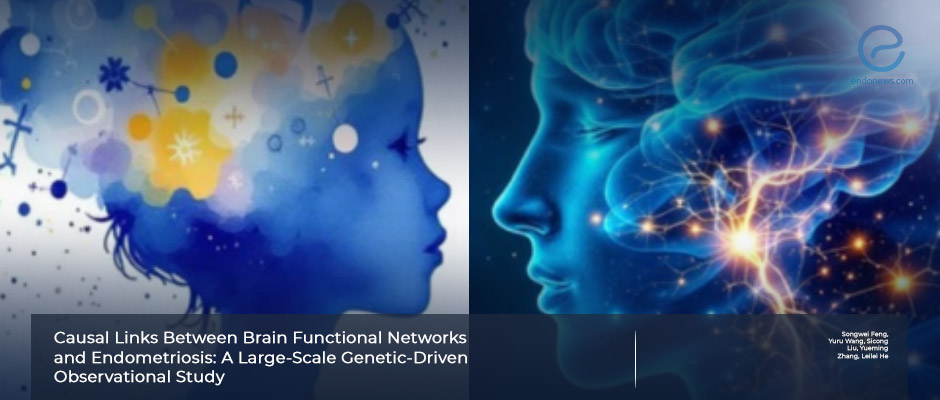Genetic Insights into Brain Networks and Their Impact on Endometriosis Risk
Mar 7, 2025
Study Links Brain Activity to Endometriosis Subtypes
Key Points
Highlight
- Specific brain functional networks influencing the risk and progression of different endometriosis subtypes are identified.
Importance
- The study provides novel insights into the bidirectional relationship between brain functional networks and endometriosis risk, emphasizing the role of neural connectivity in both protective and risk-enhancing pathways.
What’s done here
- This is a large-scale observational study aiming to identify the causal relationship between brain functional networks and endometriosis
- Genetic data from the UK Biobank and FinnGen cohorts was utilized to perform a Mendelian Randomization (MR) analysis.
Key results
- Three significant brain functional networks — Pheno20, Pheno38, and Pheno44 — were found to influence the risk of developing different endometriosis subtypes.
- Increased activity in Pheno38, part of the Subcortical-Cerebellum network, was linked to a lower risk of fallopian tube endometriosis.
- Hyperactivity in Pheno20 and Pheno44, related to the Default Mode Network and Central Executive Network, was associated with a higher risk of adenomyosis.
- Reverse MR analysis showed that endometriosis of the ovary inversely impacts connectivity in Pheno932, a network involved in cognitive and attention functions.
Strengths and Limitations
- Strengths included the use of large-scale genetic data from the UK Biobank and FinnGen cohorts, with robust MR approaches and sensitivity analyses
- Limitations included dependence on the quality of genetic instruments, focus on resting-state brain activity, and the need to explore more genetic, environmental, and lifestyle factors.
Lay Summary
While the exact origins of endometriosis are still not fully understood, emerging evidence points to the central nervous system (CNS) as a significant factor in the development and persistence of the condition. The CNS is responsible for processing pain signals, and in cases of endometriosis, it may heighten these signals, resulting in increased sensitivity to pain. Studies have identified alterations in brain regions associated with pain perception and emotional regulation in individuals with this condition, reinforcing the connection between endometriosis and brain activity.
Feng et al. from China conducted an observational study in which they aimed to investigate the causal links between brain functional networks and endometriosis, using genetic data to determine how changes in brain function may impact the risk and progression of the disease. The study was published in the February 2025 issue of the International Journal of Women’s Health.
This study used genetic data from the UK Biobank and FinnGen cohorts to investigate the relationship between brain functional networks and endometriosis through Mendelian Randomization (MR) analysis, selecting 191 resting-state functional MRI (rsfMRI) traits after rigorous quality control. Causal effects were assessed using the inverse-variance weighted method, with additional MR approaches and sensitivity analyses ensuring the robustness and reliability of the findings.
The study identified specific brain functional networks that may influence the risk of developing endometriosis. Forward MR analysis identified three significant brain networks — Pheno20, Pheno38, and Pheno44 — with distinct effects on different endometriosis subtypes. It was shown that increased activity in Pheno38, part of the Subcortical-Cerebellum network, lowers the risk of fallopian tube endometriosis, possibly due to the cerebellum’s role in modulating pain perception and emotional regulation. On the other hand, Pheno20 and Pheno44, linked to the Default Mode Network and Central Executive Network, were associated with a higher risk of adenomyosis, suggesting that hyperactivity in these regions may exacerbate disease symptoms through cognitive and emotional dysregulation.
The authors discuss that reverse MR analysis showed that endometriosis of the ovary inversely impacts connectivity in Pheno932, a network involved in cognitive and attention functions. This aligns with clinical reports of cognitive impairments in endometriosis patients, possibly linked to neurological changes.
To conclude, the authors emphasize the need for further research to explore the neurobiological underpinnings of endometriosis and develop targeted interventions to improve patient outcomes.
Research Source: https://pubmed.ncbi.nlm.nih.gov/39959755/
endometriosis brain functional network central nervous system

